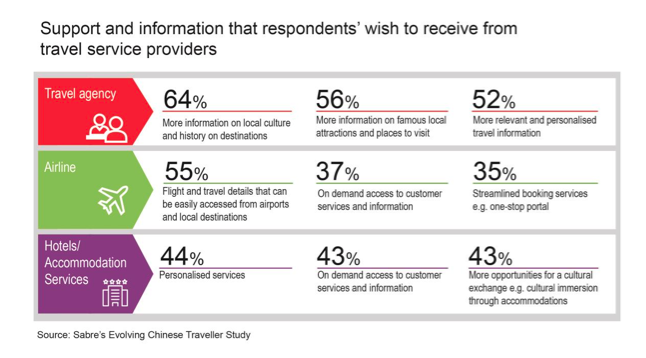Amid burgeoning information and greater opportunities to travel, Chinese travellers are wanting more personalised holidays while still valuing support from travel service providers, according to Sabre’s Evolving Chinese Traveller Study.
Today, nine out of 10 Chinese travellers say they have the means and are hoping to travel more frequently as compared to five years ago, with top contributing factors being better disposable income (20 per cent), enabling technologies that make travel more convenient (17 per cent) and access to relevant information (15 per cent).
Sabre refers to this as “a new era of ‘mass tourism’”, with travellers starting to pay attention to quality and become more inclined towards personalised travel experiences.

Seventy four per cent of respondents expressed they are willing to spend time and energy on their travel plans, although this does not come at the expense of external support. In fact, 78 per cent of respondents still welcome support from friends, relatives and travel service providers.
From travel agents, respondents mainly wish to get more information on local culture and history (64 per cent), famous local attractions (56 per cent), and more relevant and personalised travel information (52 per cent).
Three to five years ago, respondents felt that there was a lack of travel information available to them (60 per cent). Now, 46 per cent believe there are too many travel options and information available.
Meanwhile, the report noted that the new generation of travellers – comprising digital natives who grew up with the Internet – tend to be more demanding when it comes to travel experiences, and are motivated beyond traditional sightseeing.
The top travel motivations for these travellers are to find an outlet where they can relax (25 per cent), have a good time with friends or family (22 per cent), and seek a better understanding of foreign cultures (17 per cent).
Sabre observed there are two overarching attitudes toward travelling. While 49 per cent of the respondents see travel as a means of personal improvement, over half (51 per cent) say it has become a new form of social currency.
For the latter, this means that travel has become a platform to connect and build stronger emotional bonds (57 per cent), and a way of enriching their life experiences to share with friends and family (56 per cent).



















